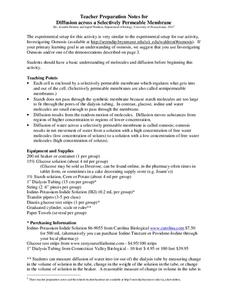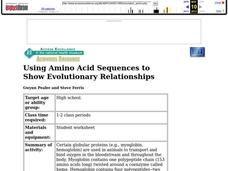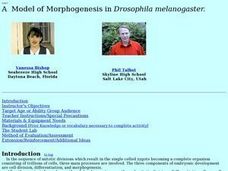Curated OER
Diffusion Across a Selectively Permeable Membrane
Students investigate how water passes through cell membranes. In this biology lesson, students differentiate osmosis and diffusion. They illustrate the movement of water in both processes.
Curated OER
Molecular Approaches to Evolution
Students are introduced to working with molecular data. The first activity does both simulated and original data are used to compare amino acid, protein or DNA differences to construct phylogenetic trees or cladograms. These activities...
Curated OER
"Who Done It?" Analysis of Molecular Fingerprints Left At the Scene of the Crime
Students examine different types of DNA fragments. They record and analyze their results. They determine who is the criminal in the story.
Virginia Department of Education
The Ratio of Surface Area to Volume
Demonstrate the ratio of surface area to volume in your high school class by using phenolphthalein, gelatin, and an onion. Intrigue the class by leading a discussion on osmosis and diffusion, then making "scientific jello." Participants...
Curated OER
Catalase: A Bioinformatics Case Study
Pupils investigate the physical structure of a protein by using a computer simulation tool. They record its primary amino acid structure while viewing it in three dimensions for a better visual recognition. There is also a comparison to...
Curated OER
Strawberry Smoothies
Biologists extract the DNA from a strawberry. After completing the procedure, learners write answers to a few questions on the lab sheet provided. This is ideal lab practice during a DNA unit in your general biology course.
Curated OER
Using Amino Acid Sequences to Show Evolutionary Relationships
Compare protein fragments, count amino acids, and use the information to explore common ancestry. The resource mentions a student worksheet, however, a separate printable worksheet is not provided. The exercises are written into the...
Curated OER
Using Amino Acid Sequences to Show Evolutionary Relationships
Junior biologists compare the amino acid sequences from fragments of five different globin molecules. They count the letter differences between each species pair. They construct a graphic representation of the evolutionary relationships...
Curated OER
Ah Choo!
Students compare bacteria to viruses to find the differences. In this biology lesson plan, students research viruses they have been inoculated against, using the Internet. Students complete a graphic organizer of their research on common...
Curated OER
Bacterial Transformation Kit
Students participate in an experiment in which they practice moving genes from one organism to another. They examine the results of a recombination of jellyfish. They identify different types of bacteria as well.
Curated OER
Physiological Adaptations
Students investigate the concepts of genetics and how it is tied to the variations found within different species and how it is tied to adaptations. They review the theory of evolution and factors found to help create variation. The...
Curated OER
Blood Business
Students identify the different kinds of blood. In this biology lesson, students investigate the antigens, agglutinins and Rh factor using their own blood. They use Punnett squares to predict blood type of offspring.
Curated OER
Constructing a Phylogenetic Tree Using DNA Sequence Data
Students analyze DNA sequence differences between organisms in order to establish a reasonable picture of the evolutionary relationships between them. They take the role of molecular biologists and make genetic changes and constructing...
Curated OER
Island Biogeography and Evolution
Students use this activity as a logic problem that is based on real organisms and real data. The problem is to develop phylogenies for seven related populations of lizards living on the Canary Islands. Three phylogenetic charts are...
Curated OER
Protein Assays: Bio Rad and Page Gels
Students conduct the Biuret Test and the Bio Rad Protein Assay. They examine the spectrophotometer and graph molecular weights and the concentrations of the proteins investigated. They prepare solutions for the Bio-Rad test and use the...
Curated OER
Genetics 5 Technology
Students, after studying extraction and gel electrophoresis, recombinant DNA, transgenic organisms, and reproductive cloning, summarize the main concepts in DNA technology. They analyze the applications of DNA: forensics, medicine,...
Curated OER
Asexual versus Sexual Reproduction
Students explore reproduction. They research organisms and groups of organisms to determine whether they reproduce sexually or asexually. In addition, they determine the organism's habitat.
Curated OER
GMOs: Should We Grow Them?
Students examine the ethics of biotechnology and genetically modifying various organisms. They complete various activities and labs on GMOs and then write a position paper regarding their individual opinions on the subject.
Curated OER
Species Diversity and Phylogeny
Students explore the classification system of organisms: taxonomy. They examine prepared slides of Protozoans and record information on a Taxonomy Recording Sheet. Two additional classifying activities are also included in this lesson.
Curated OER
Gene Regulation Mechanisms
Students explore genetics. They discuss how chromosomes and/or genes are regulated during the life of an organism. In a lab setting, students compare and contrast the genomic regulation of prokaryotic and eukaryotic cells using...
Curated OER
The Case of Regulation in Cells
After your biologists have learned about transcription, translation, and gene regulation, they work in a small group to create a poster of a system that serves as an analogy of the gene regulation process. They share their creations with...
Curated OER
A Model of Morphogenesis in Drosophila Melanogaster
Students investigate the following scientific terms and ideas: rates of diffusion, the role of morphogens in the development of larva, the chemical dynamics of a cell, and the significance of embryo polarity during development.
Virginia Department of Education
The Cell Cycle and Mitosis
What a packed lesson! Provide your class with the opportunity to learn about the cell cycle in several exciting ways. Biologists first learn about the theory behind mitosis, then proceed to view onion tips under the microscope and create...
Virginia Department of Education
Structure and Function of Cell Membranes
Lead your high school class on an exploration inside the cell. Individuals investigate the relationships between cells structure and function given their relative locations on the cell membrane. They explore the concept of homeostasis...

























